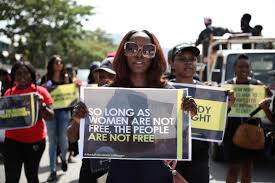Resisting the Unspeakable: Healing the Language of Neoliberalist Politics

We are living in a time where our language is in crisis. As Masha Gessen describes, the Trump era has caused our politics to become “unimaginable, unthinkable, and unspeakable” (132). Our language is in dire need of redefinition and pedagogical intervention; words like “truth” and “fact” have ceased to have meaning, making our world unrecognizable or alien. Stanley Cohen writes that “there seems to be states of mind, or even whole cultures, in which we know and don’t know at the same time,” which perfectly sums up this problem (Alexander). We are living in a time of “unspeakable acts” that are both known (we acknowledge their existence) and unknown (since we lack the language to discuss them), resulting in a crisis of civic illiteracy. By using the trauma theories of Christina Lam, Madeline Hron, and Elaine Scarry, I will argue that silence is natural response to trauma, and is helpful if not crucial to engaging civic illiteracy as a response to the fear and trauma caused from our neoliberalist politics. The works of Masha Gessen, Timothy Snyder, Angela Davis, and Henry Giroux will guide my discussion of what it looks like to begin to heal these silences. Overall, I argue that we must begin to recognize the ties between the trauma of neoliberalism and the crisis of civic illiteracy, so that we can begin to work on healing the gaps in our language. Only in resisting “the unspeakable” and working to establish a language of critique and possibility are we able to imagine and hope for a better future.
Many scholars over the years have shown how silence is linked to trauma by explaining how our words are often insufficient to explain the pain and fear we feel. Indeed, Elaine Scarry writes that “[pain’s] resistance to language is not simply one of its incidental or accidental attributes but is essential to what it is […] it is not of or for anything. It is precisely because it takes no object that it, more than any other phenomenon, resists objectification in language” (4-5). For Scarry, it is no coincidence that silence and trauma are so linked, as our language is too limited to positively describe trauma. Survivors of trauma often feel this way too. Writing about his experience in a concentration camp, Holocaust survivor Elie Wiesel states: “I had many things to say, I did not have the words to say them. Painfully aware of my limitations, I watched helplessly as language became an obstacle” (iii-iv). Wiesel’s work demonstrates the truth in Scarry’s claim that language is not only restrictive when it comes to explaining trauma, but also an obstacle one must try to overcome. Christina Lam’s work points out a crucial irony in this (dis)connection between words and trauma. She explains that “what the trauma survivor cannot articulate for herself is ironically set against the compulsion to tell, to capture the experience in thought, memory, and speech in order to make sense of the nonsensical, […] one that results in the shutting down of the self” (37). Thus, though trauma survivors are often silent, they wish to make sense of their experience through speech and memory. Most importantly, Lam points out that this irony often results in one shutting down; if we wish to explain our trauma and yet feel as though our language cannot do so, we ultimately begin to stop trying and give into the silence. We use words like “unspeakable” or “unthinkable” to describe these experiences instead of working to redefine our language to bear the burden of our trauma.
With the link between silence and trauma established, I will now begin to explore why our neoliberalist politics can be defined as a social, emotional, and physical trauma. This definition is perhaps seen best through what Henry Giroux calls “the politics of disposability” or what Marc Lamont Hill describes as being “death-eligible.” For Lamont Hill, death-eligibility means that “within this neoliberal universe, citizenship is measured by our ability to be consumers” (41) and therefore our most vulnerable populations “are viewed as burdens unworthy of investment, protection, or care. Since they have no value to us in terms of market logic, we express no collective concern for them. We do not care if they live or die. They are disposable” (41-42).
Without realizing that our neoliberal politics was set up for only a privileged few to succeed, the irony exists that those who need the most help are viewed as simply “not trying hard enough” or as making some kind of choice that resulted in their failure to succeed in neoliberalism. This political system “succeeds” because it continues to reinforce systems of oppression, wherein issues of race, class, gender identity, and sexual orientation (to name a few) compound together to ensure that only the privileged few reap the rewards of capitalism. Anyone who has been pushed out or excluded from these systems of privilege, in the eyes of our society, is entirely disposable.
Henry Giroux situates this politics of disposability in its larger context as well, writing “neoliberalism has produced a plague marked by egregious degrees of exploitation, unchecked militarism, and a racialized politics of disposability in which human beings were viewed as expendable, reinforced if not propelled by an ethos of white nationalism and white supremacy” (xii). As Giroux points out, our politics of disposability are inherently tied to racism, as well as other structures, that have somehow convinced us that human beings are expendable. To live in a world where the people around you are deemed inhuman and worthy of violence and even death is to live in a world that perpetuates trauma on a daily basis.
If our neoliberalist politics have created an environment of fear, isolation, and death that exists in every aspect of our lives, it is no wonder that we have lost the ability to talk about the trauma that we experience. However, the war on language is also being acted out through the subjectification of truth. Not only have we lost the ability to talk about politics because the reality of the pain seems to exist beyond works, but also because figures like Trump are actively working to remove meaning from the words we use. As some kind of postmodern semantic satiation, Trump repeats words so often that they lose their meaning. Masha Gessen discusses this idea by arguing that during Trump’s presidency “the Times had a policy of not calling every racist remark ‘racist’ and every lie a ‘lie’ but reserving those words for only the biggest lies and the most racist comments” (126). Gessen shows how the words “racist” and “lie” did not mean what we used to think; only the most extreme cases were tied into that category, which demonstrates how our language was beginning to lose meaning. Timothy Snyder also remarks that the truth dies in four modes, the first being an “open hostility to verifiable reality, which takes the form of presenting interventions and lies as if they were facts. The president does this at a high rate and fast pace. One attempt during the 2016 campaign to track his utterances found that 78 percent of his factual claims were false” (66). With this in mind, it is no wonder we have a hard time holding onto objective truth, when the leader of the United States lies more often than he tells the truth. Just like “racist” and “lies,” the word “fact” has been unattached from its original meaning, showing once again how our language has been disintegrating. Therefore, when we say we have a problem with civic illiteracy, it is not just that neoliberalism has caused a trauma so intense that our language seems inadequate to describe it, but that the objective meaning of our language is being taken away. This is concerning not only because this silence in our politics is a symptom of pre-fascism, but also because we need language in order to imagine a better world and to begin to establish hope in our politics again.
This connection between neoliberalist trauma and silence is made even clearer when looking at the Trump Era more broadly. Gessen describes living through Trumpism as “this can’t be happening. This is happening – the thought pattern of nightmares and real-life disasters has become the constant routine of tens of millions of people […] if the word ‘unthinkable’ had a literal meaning, this would be it: thinking about it makes the mind misfire” (132). Just as Stanley Cohen describes our culture as one “in which we know and don’t know at the same time,” Gessen describes the “this can’t be happening. This is happening” dichotomy, wherein we are continually confronted with scenarios that we cannot comprehend, and yet must try to. Gessen continues, stating “The Trump Era is unimaginable, unthinkable, unspeakable. It is waging a daily assault on the public’s sense of sanity, decency, and cohesion. It makes us feel crazy, and the restrained tone of the media compounds this feeling by failing to acknowledge it” (132). Gessen’s description of the Trump Era here makes an explicit connection to how theorists talk about pain and trauma: as trauma studies scholar Madeline Hron argues, “pain matters – or gains significance – only insofar as the sufferer perceives it and acknowledges it” (38). Pain in the neoliberal era thus becomes inchoate and insignificant not only because we cannot acknowledge it, but also because our media refuses to acknowledge it. If a lie is no longer a lie, and someone who commits racist acts is not a racist, we have no longer have a language to use to try to make sense of our world, leaving us in silence. This response to the trauma of neoliberalism is not a silence of contemplation, but a silence of fear.
One pertinent question to ask at this point is: how did we get here? By establishing some of the forces that led us to our current path, we can begin to see what we need to unlearn and unpack to move forward to a better future. One of the factors that lead to our loss of civic literacy is the normalization of neoliberalist capitalism. As Mark Fisher points out, capitalism “presents the widespread sense that not only is [it] the only viable political and economic system, but also that it is now impossible even to imagine a coherent alternative to it” (12). One of the more insidious messages that is implicit in capitalism (and specifically neoliberalist capitalism) is the idea that this is not just the best political, economic system, but the only one we can have. Fisher describes imagining a different system as “impossible,” a word with similar ties to “unthinkable” and “unspeakable” as it points to the end of language in describing an idea. When another system becomes impossible or unthinkable, the result is that we normalize our current economic, political system. Giroux explains this further, stating “when issues are defined through the false narrative of a ‘natural order,’ matters of self- and social responsibility degenerate into paralyzing forms of indifference or cynicism. All that is left is an alien world” (5). How do we begin to criticize a world that has become “alien” by presenting us with a series of traumas and then labelling it the “natural order”? The short answer is we cannot. Therefore, by enforcing the normalization of neoliberal capitalism we forget to question the issues we see around us, or we get so overwhelmed by them that it seems impossible to know where to even begin to attack these systems of oppression. But that is exactly what capitalism wants us to believe; it purposefully perpetuates normalizing itself as a way to take away agency and power from people and communities. And so we have to learn not to accept neoliberal capitalism as the norm, and not to resign ourselves to what Timothy Snyder calls “the politics of inevitability” or “the sense that history can only move in one direction” (118). We need language as a foundation for the radical imagination required to build a new economic and political system.
For many scholars, the normalization of neoliberalism seemed to be inherently tied to our loss of historical memory. For example, Naomi Klein writes that “generations who had grown up under neoliberalism struggled to picture something, anything, other than what they had always known. This may also have something to do with the power of memory” (219). Indeed, she then quotes Milan Kundera who said, “the struggle of man against power is the struggle of memory against forgetting” (219). People like Trump want us to forget what happened in the past, because if we do then we will not recognize how much his politics echo the previous fascist regimes. However, if we follow Klein and Kundera’s advice, we must look to the past and remember so as to give ourselves the critical knowledge needed to interrogate our current politics, and to resist normalizing neoliberalist capitalism. Giroux also expands on this idea, stating that “any viable resistance to an upgraded form of fascism needs new narratives, a new understanding of politics, power, and resistance […] while reviving historical memory as a forum for critically interrogating the unsettling and unspeakable” (122). Giroux not only demonstrates the explicit connection between the unspeakable and the loss of historical memory, but also highlights the dire importance of developing a new language. If we follow the unsettling and deplorable advice of “historians” like Richard Evans, who believe “[y]ou can’t win the political battles of the present if you’re always stuck in the past,” then you forget about the lessons we have already learned, and have no business repeating. Therefore, part of how we got to a place of trauma and silence within our politics, is that we did what neoliberalism taught us: we forgot.
It is also important to note that the fear and isolation we feel from the trauma of our politics has only been compounded by the Covid-19 pandemic. Marc Lamont Hill describes how the Covid-19 pandemic took advantage of our economic systems through his term “corona capitalism.” He describes this concept as “the economic conditions and institutional arrangements that made the vulnerable more likely to experience premature death” (20-21). Lamont Hill’s corona capitalism “describes how centuries of racial capitalism and decades of neoliberal economic policy not only created the conditions for the Covid-19 pandemic but also informed our legal, economic, medical, ecological, cultural, and social responses to it” (21). As Lamont Hill describes, the pre-existing conditions of our economic and political systems not only allowed for the spread to particularly affect already vulnerable communities, but also all of our responses to the pandemic have been tied to these systems. Those deemed disposable before Covid-19 were often the ones working on the frontlines, choosing between going to work and potentially contracting Covid-19, or staying at home and suffering from poverty. Those who were already isolated from their communities were now told to social distance, which both worked to keep transmission of the virus low and worked to enforce divisions within communities.
Giroux also adds that “the Covid-19 pandemic has revealed with laser-beam clarity how incapable the irrationality of a profit-driven capitalism is in dealing with a global public health crisis” (x-xi). Part of what makes capitalism so inadequate to deal with the pandemic is that it is “profit-driven” instead of people-drive, which lead to a normalization of death and furthering of social isolation. As I have discussed, the trauma of normalizing death in the politics of disposability is significant in continuing to silence people; therefore, the intensity of these crises during the Covid-19 pandemic only furthers the urgency with which we must work to heal our language.
After establishing some of the crises that accumulated throughout our politics to create a space of trauma and silence, the next question to ask is: how do we begin to move forward? One tangible solution is to begin to talk to each other; to re-establish connections within communities, friends, and families. As Timothy Snyder suggests in his work, On Tyranny, “[m]ake eye contact and small talk. This is not just polite. It is part of being a citizen and a responsible member of society. It is also a way to stay in touch with your surroundings, break down social barriers, and understand who you should and should not trust” (81). According to Snyder, by fulfilling our responsibility as citizens to remain engaged with those around us, we can begin to build a critical framework. When we begin to understand who we can and cannot trust, it shows that we are learning how to better read the people we interact with. When the term civic literacy is meaningful, as it signals both our responsibility as citizens (civic) and our ability to read, speak and understand the world around us (literacy). Something that seems as small as speaking with those around you has also been proven to make a difference.
In discussing the fall of Argentina’s democracy, Klein writes “something strange and wonderful began to happen: neighbours poked their heads out of their apartments and […] began to talk to each other. To think together” (193). She explains that these people “were trying to understand, together, how they had lost so much in the past, and building relationships to precent those mistakes from ever being repeated” (193). As Klein points out, coming together and talking with those around us not only helps us to try to make sense of what has been lost, but also works to resist historical amnesia and reinstate a significant historical memory. While this may seem difficult in our current pandemic conditions, it remains as important as ever to remain connected to our communities and to continue a dialogue of truth, hope, and resistance.
However, it is not just connection in our communities that is necessary to rebuild our language. We must also make sure to talk about the ways that our socio-economic issues are interconnected as well. When we talk about capitalism we must also talk about racism, and when we talk about neoliberalism we must also talk about feminism, and when we talk about fascism we must also talk about economic class, and so on. Two scholars who highlight this need especially well are Angela Davis and Naomi Klein. For example, Klein writes that “our most pressing task” is “finding and strengthening the threads that run through our various issues and movements” (233). Our oppressive systems are structured in a way that they work to fuel each other, and so when we attack one issue we must be ready to also attach the other systems that are interconnected; the threads that weave neoliberal capitalism together must be unravelled together if we are to make a real difference. Angela Davis supports this approach, stating that “this is a period during which we need to begin that process of popular education, which will allow people to understand the interconnections of racism, heteropatriarchy, capitalism” (Democracy Now!). Davis makes the connection between public education and civic literacy clear here: as we work to rebuild our language we must teach people to speak in terms of interconnectedness, rather than isolated issues and isolated individuals. Indeed, Giroux also supports this idea, stating “to fight this plague of neoliberal fascism and economic domination, a radical understanding of politics has to think in terms that are interrelated, comprehensive, and intersectional.” (233). When we talk about solving the trauma and silence of our politics, our approach must be inherently focussed on connections: not just connecting groups of people together, but also connecting larger issues together. Our neoliberalist trauma has actively attempted to keep us silent, so it is essential to examine these broader issues when working to develop a new political language.
Lastly, it is important to keep in mind the end goals of these solutions. The ultimate goal I am advocating for here is the continued resistance of the idea of “the unspeakable” in our current politics, and for the establishment of a language of critique and possibility as a foundation for that resistance. While forming connections is a solution to the problem, it is essential to remember that we are making those connections as a way to rebuild language. As Gessen writes, “the leader or leaders who will help American politics heal after Trump will need to re-embrace the language of ideals – and hope.” (162). Though hope is often dismissed as naïve or insignificant, the idea of instilling a population with hope is actually a radical act, as it effectively returns agency to people who have been continually deprived of it. As well, Giroux points out that the Covid-19 pandemic has helped to reveal some of those moments of hope that are beginning to blossom. He writes, “the pandemic that threatens democracy should also offer up the possibility to rethink politics and habits of critical education, human agency, values, and what life should look like in a democratic socialist society.” (xi). In a world where our politics of disposability are on full display, they have been harder for the general population to ignore, and movements such as BLM and prison abolition have been gaining momentum. As Giroux states, “amid the devastation produced by neoliberal capitalism and Covid-19, there are also flashes of hope, a chance to move beyond a contemporary resurgence of authoritarianism” (xi). The language of hope and critique is beginning to pop up in our society, and it is our responsibility to continue to foster that language in order to create a real difference.
In conclusion, our current crisis of civic illiteracy can be seen as a trauma-response to the fear and the pain caused from our current neoliberalist political system. Our language has lost its meaning, and so we lack a framework to discuss the issues we see in our world. This crisis has been fueled by the normalization of neoliberalism and the loss of our historical memory, both of which work to isolate us from our communities and our pasts. Some of the solutions offered in this essay include the insistence on opening dialogues within communities and addressing our socio-political issues with an intersectional lens. The current Covid-19 pandemic has only compounded the issues already prevalent in our society, and so our sense of urgency to work on these solutions has only intensified in the past months. Overall, the ultimate solution offered here is to establish a language of critique and possibility as a way of resisting “the unspeakable” in our current politics. Only in doing so can we begin to re-establish agency and hope in our politics, and radically imagine a new future.
Read more at By Cassidy Burr.
Cultural Pedagogy, Essays, Public Pedagogy, ResistanceRelated News
News Listing

By Maya Phillips ➚
Failure to Reeducate: Perpetuations of Cultural Fascism in Post-War Germany
Articles, Cultural Pedagogy, Public Pedagogy
February 9, 2026

By Rosemary Kasiobi Nwadike ➚
Feminist Miseducation in the Afro-West: Examining (In)Formal Gender Indoctrinations
Articles, Education, Resistance, Social Justice
July 11, 2025

